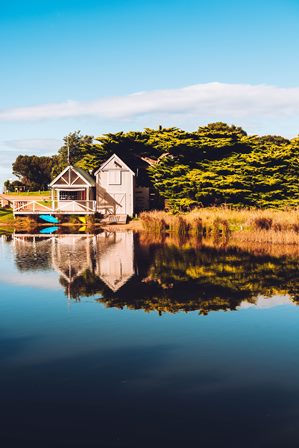
Water, the universal solvent, is the “shui” of Feng Shui. Used for so many purposes, water is actually one of five elements used as a remedy in Five-Element-Theory. Usually when we need water as a remedy in a house, the more water used, the better the results can be. This is one reason why I steer clients away from tiny fountains that hardly hold any water. The average-sized room that needs water should have a gallon or more. The tiny fountains that only hold a cup or two of water may be cute, but not all that effective.
Outside water features should contain many gallons of water and a pool can completely correct a house that needs water behind it. The main requirements for water to work effectively as a Feng Shui remedy are that the water is clean and that it circulates for at least a few hours per day.
Other aspects to a water remedy can include the location of the water, the direction the water flows, and the speed at which it moves. Are there bad locations for water? Yes! As with all the elements, their use should be strategic and specific to the space being evaluated. There are not really any generically good places to put water or for all times.
In Xuan Kong Fei Xing (Flying Star Feng Shui), we factor in when the structure was built and its precise compass alignment to determine the best locations for both inside and outside water features. An example of a bad location for water in the year 2011 was the North sector of a house. Even though the direction of North is inherently related to the water element, this does not mean we arbitrarily place water there all the time. For 2011, there was visiting energy related to gossip, bickering and legal problems in the North. Placing water there would have only triggered those negative energies further. In 2012, that same energy shifted to the direction of southwest and that was a problem location for water in your house for that year.
What is virtual water? Since wide open spaces are considered virtual water, there can be some subtle effect when a property is next to a “virtual” water spot. This could be a parking lot or a park that is very open and not a lot of trees, as two examples. Lower land level is also considered virtual water since it carries the qi (air currents) downward like water. So, if a person has a significant drop in the land level on either side of their home, this can be called virtual water. It is then deemed auspicious or unlucky based on more data about the house type.
Is a picture or photograph of a lake or pond also considered virtual water? Not really. Images of water might have their own soothing or psychological effect, but they are not really considered virtual water in the same category as wide open spaces, which can have an effect on a place whether the people are aware of it or not.
Not as effective as real water, but better than no remedy at all, is the color blue or black. Large surface areas (like walls) that are blue or black will resonate some of the water element and that could be cast in the category as virtual water as well.
To really understand how to use water properly and in the most sophisticated ways, you are invited to study classical Feng Shui or secure the services of a highly trained professional. In the same way that you would not want to treat yourself with acupuncture needles without being a trained acupuncturist, those interested in Feng Shui sometimes do not know just how complex the practice really is.
Water can help people in many ways, including resolving back and leg pains, relationship problems, creative blocks, and for increasing prosperity. But you have to know how to correctly use the water. Placed randomly, water can have a negative impact and possibly contribute to heart or eye problems, crime, infidelity or legal conflicts.
Author: Kartar Diamond
Company: Feng Shui Solutions ®
From the Feng Shui Theory Blog Series

